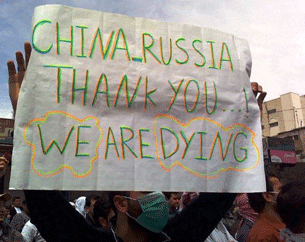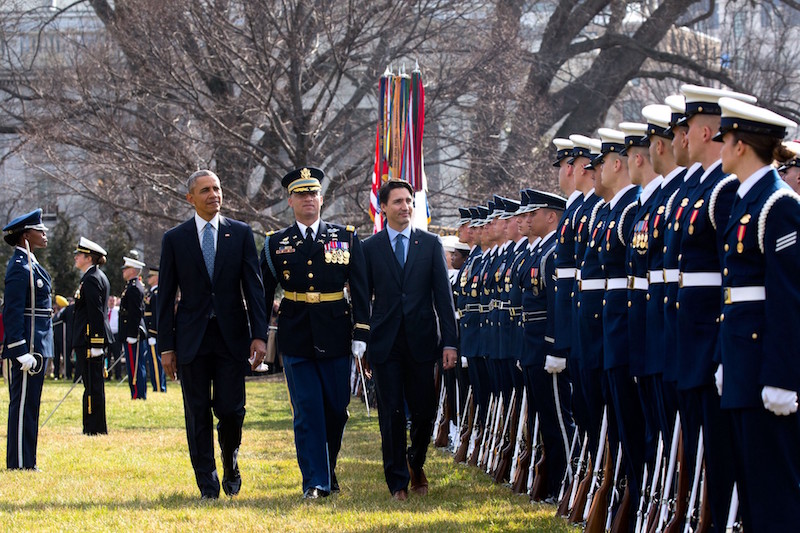On Wednesday, September 18, Jordan’s King Abdullah exhorted China to use its weight as a permanent member of the UN Security Council to help resolve the Syrian crisis. Until now, with the exception of voting in favour of Security Council resolutions to investigate the chemical weapons attacks, China has used its veto to block any action against the Assad regime. Aside from that, China has stayed in the shadows of the dispute, leaving Russia to battle it out with the US on the world stage, and has avoided giving press conferences or media appearances in support of the Assad regime. This prompts the question: what is at stake for China in Syria?
There are three factors shaping China’s Syria strategy. First, there are China’s economic interests to consider. China has steadily risen to prominence in the international system on the back of its tremendous economic growth over the past two decades, and its leaders have developed a clear plan to ensure the continuation of that rise. The plan has been exposed in a series of “white papers” released to the public, including the 2005 “China’s Peaceful Development Road.” This paper makes the case that peaceful coexistence with the rest of the world will enable China to keep its economic growth on track, and confirms China’s interest in avoiding military conflict and minimising the spread of such conflicts when they arise elsewhere in the world. In a final rhetorical flourish, the 2005 white paper asserts China’s desire to promote “democracy in international relations,” by which is meant that relations between states should be conducted according to existing international norms and practices unsullied by coercive threats. In a nutshell, this is China’s “peace and development” strategy: it seeks its own continued economic development but not at the cost of the vital interests of other countries.
So, why is China so reticent to get involved in the efforts to end the Syria conflict? Isn’t a long lasting peace what China wants? The realities of the conflict make plain why China is following a hands-off strategy. Syria might not be at peace, but while Assad remains in power the Chinese leadership has come to the conclusion that the conflict can be confined to Syria’s borders, while its neighbours can be counted on to reduce the risks of the conflict spreading to other countries by absorbing the hundreds of thousands of Syrian refugees. Should the Assad regime fall, there is no viable alternative government. Under these circumstances, the most likely outcome will be chaos, resulting from infighting between the various rebel factions, including those connected to al Qaeda. This scenario has the prospect of producing far greater instability in the region and would pose a far greater problem for China’s economic interests in North Africa and the Middle East.
The second factor has more to do with the international balance of power than it does with China’s economic interests. It is rooted in the age-old approach of realpolitik. Put briefly, in Syria, China seeks to maintain a regime that has been a useful friend to both itself and other like-minded states, mainly Russia and Iran, in order to protect its limited sphere of influence in the region and impede the interests of the United States. The Assad regime allows Iran to coordinate efforts with Hezbollah in its proxy war with Israel, while allowing Russia a military presence in the region at its naval base in Tartus, two factors that constrain the US in the pursuit of its interests in the region. A 2013 white paper titled “The Diversified Employment of China’s Armed Forces” warned against “US hegemonism” and the its “pivot” towards Asia, indicating the Chinese desire to limit the influence of its main rival as much as possible.
The third factor in China’s stance on Syria is its long-time support for the principle of inviolable state sovereignty and non-intervention in another state’s domestic affairs; revolutions, civil wars, and human rights violations notwithstanding, no state has the right to intervene in another state’s internal matters. Just as it opposed intervention in Kosovo in 1999, now China opposes intervention in Syria, and claims the backing of international law for its position. Behind its rhetoric, of course, stands the awareness among the Chinese leadership that its own legitimacy may be fragile and not immune to challenges from within. Its standoff with Taiwan may not last forever, and it may in the future decide on a course of action to bring the province back into the national orbit that it will claim is a purely domestic matter. The last thing it wants is to open the door to foreign intervention should trouble become widespread within its own borders. On no account, then, does China want it to become an accepted international norm that foreign powers may intervene when people take up arms against their own governments. Syria is another test of this principle.
[captionpix align=”center” theme=”elegant” width=”300″ imgsrc=”http://natoassociation.ca/wp-content/uploads/2013/09/xi-jingping-putin.jpg” captiontext=”China’s Syria strategy is based on the pursuit of its own national interests”]
In all, China’s Syria strategy is based on the pursuit of its own national interests and the interests of the governing Communist Party: stability is necessary for the country’s continued economic development, containment of “US hegemonism” to maintain the existing balance of power, and reinforcement of the principle of state sovereignty to build a wall against the potential for foreign intervention in its own internal affairs.




